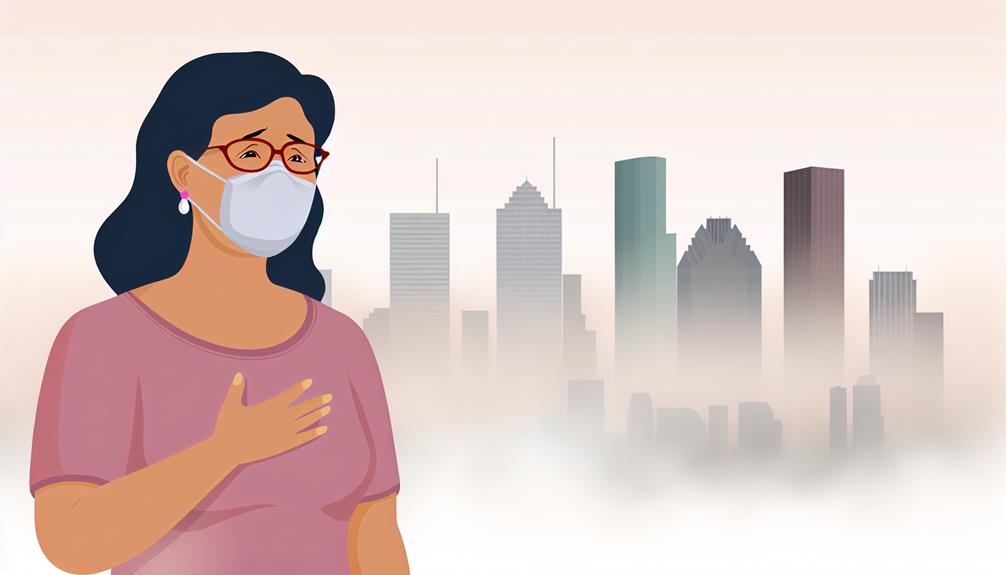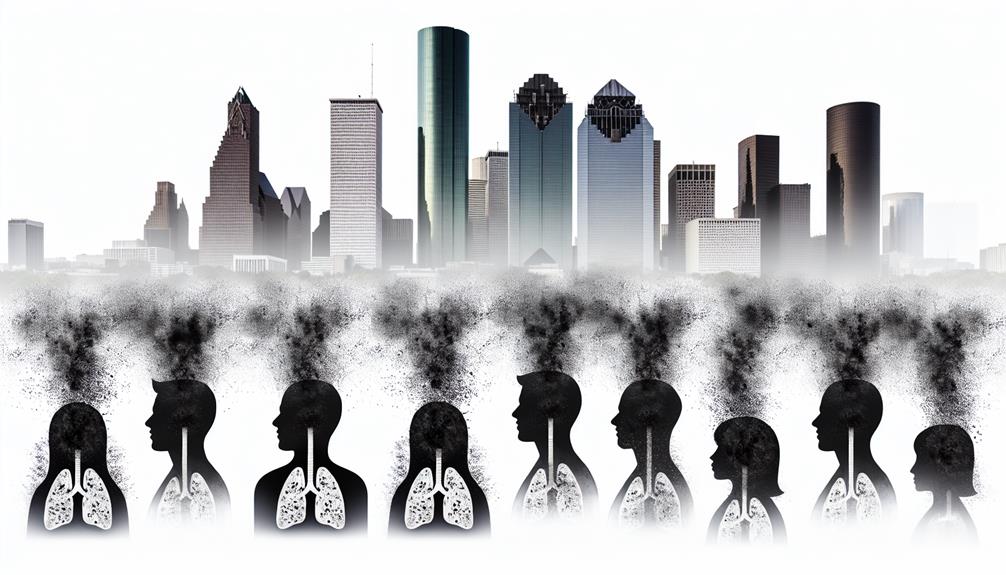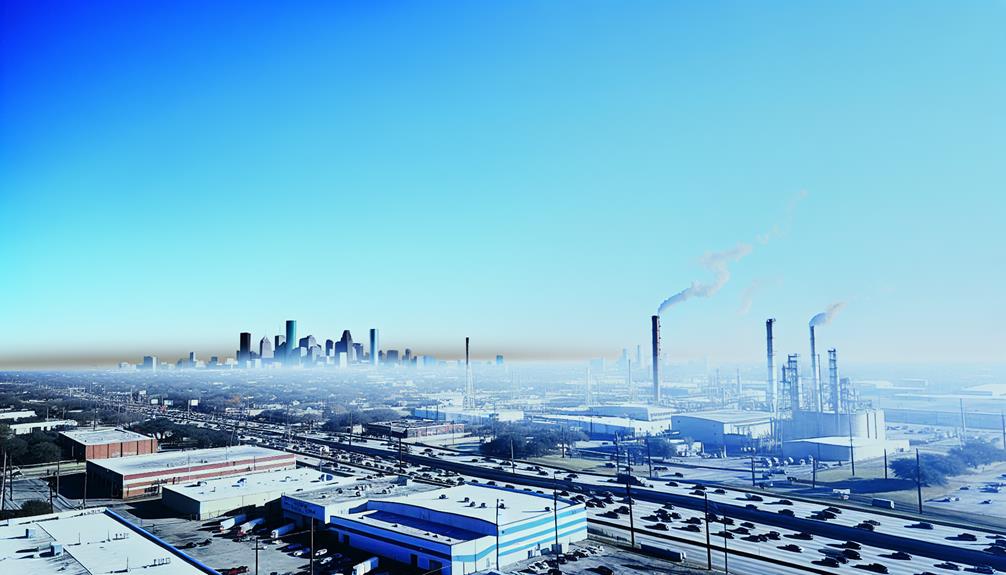As you navigate through your day in Houston, it's pretty remarkable how the air you breathe could be impacting your health more than you think.
The unsettling reality about Houston's air quality goes beyond what you see, with hidden pollutants lingering in the air. These pollutants have been tied to various health issues, but what are the actual risks of inhaling Houston's polluted air?
Keep reading to uncover the concealed dangers that might be affecting your well-being without your awareness.
Impact of Houston's Air Pollution
Air pollution in Houston is a big deal, especially from ozone and PM2.5, causing over 5,000 premature deaths and a whopping $49 billion in economic damages every year. This pollution seriously impacts public health, hitting communities of color hard by worsening respiratory conditions like asthma and bronchitis. Houston is up there in the top 10 cities with the worst ozone pollution, making it a major health concern.
Notably, nearly half of schools and childcare centers in Houston are surrounded by high levels of nitrogen dioxide, posing extra risks, especially for kids, leading to respiratory problems such as asthma and bronchitis. Recognizing these disparities in pollution exposure is key to tackling public health issues and finding targeted solutions to protect vulnerable groups.
Pollutants Affecting Houston Residents
Living in Houston means dealing with air pollution on a daily basis. The air here is filled with harmful stuff like ozone, PM2.5, and cancer-causing agents that can mess with your lungs and heart.
High levels of nitrogen dioxide, sulfur dioxide, and other toxic compounds float around, making it more likely for folks to develop asthma and other breathing problems.
Thankfully, folks are working hard on rules, cleaner fuel standards, and health programs to clean up the air and keep folks safe, especially those who are extra sensitive to pollution.
Types of Pollutants
Living in Houston exposes you to a mix of pollutants that seriously impact your health, especially your respiratory system and overall well-being. The main offenders, ozone and PM2.5, are notorious for causing respiratory issues. Houston's air pollution also contains carcinogens that can lead to severe illnesses like cancer.
Volatile organic compounds in the air contribute to creating ground-level ozone, worsening respiratory problems. Additionally, heavy metals such as nickel and cadmium compounds found in the pollution can harm your health.
Residents face risks from pollutants like sulfur dioxide, nitrogen dioxide, and particulate matter, all affecting their health and quality of life. It's crucial to be aware of these dangers and take steps to protect yourself and your loved ones from the harmful effects of Houston's air pollution.
Health Impact Data
When we look at how pollutants impact the health of folks in Houston, the risks to their well-being and respiratory health are pretty significant. Ozone and PM2.5 are big players in the pollution scene here, definitely posing health risks.
The city's air isn't all roses either, with carcinogens and other pollutants adding to the mix of hazards. In Houston, there are nine pollutants that are likely to cause health issues, while about 24 others might also have negative effects based on limited evidence.
On top of that, there's a whopping 118 pollutants where the health risks are still up in the air due to incomplete info. It's a complex puzzle trying to figure out how all these pollutants affect us, but understanding and tackling them head-on can help reduce these risks and boost our overall well-being.
Vulnerable Populations
Pollution from substances like ozone and PM2.5 poses a real threat to vulnerable groups in Houston, particularly kids, seniors, and those with existing health issues. The city sees higher rates of asthma due to ongoing exposure to these harmful pollutants, impacting people's ability to breathe easily and enjoy a good quality of life.
Certain areas near industrial sites carry even higher health risks because of elevated pollution levels, especially for folks in underserved communities. Houston's air quality issues hit communities of color, low-income areas, and places with limited healthcare options the hardest, worsening existing health gaps.
Particularly during extreme weather or hot spells, the health effects of Houston's air pollution can escalate, leading to more respiratory problems and other health issues.
Health Risks From Ozone Exposure
Hey there, folks in Houston! Let's chat about keeping safe from ozone in our city.
It's super important to take steps like chilling indoors during peak ozone hours and backing policies that cut down on ozone emissions.
Breathing in too much ozone in Houston can really mess with your lungs, possibly causing issues like asthma, bronchitis, and worsened lung conditions.
High ozone levels can lead to chest discomfort, coughing, throat irritation, and inflammation in your airways, which can also impact your heart health.
It's all about looking out for our respiratory well-being in the hustle and bustle of Houston life. Stay safe, y'all!
Ozone and Respiratory Health
Living in Houston means dealing with the everyday reality of air pollution, especially ozone, which can really mess with your respiratory health. For folks with asthma and bronchitis, it's like adding fuel to the fire. The more ozone in the air, the worse your breathing gets, leading to more coughing, wheezing, and trips to the hospital. And let's not forget how this hits harder on those who are already vulnerable.
Long-term exposure to ozone isn't just a one-time thing – it sticks around to haunt you with ongoing respiratory problems and a steady decline in lung function. That's why keeping an eye on ozone levels is crucial to protect the community's health and cut down on respiratory issues in Houston.
Ozone and Cardiovascular Risks
Living in Houston comes with a real concern for your heart health due to the high levels of ozone pollution in the air. This pollution isn't just about hazy skies; it can actually pose serious risks like heart attacks and strokes.
When you're exposed to ozone in Houston, it can spark inflammation in your cardiovascular system, potentially making existing conditions worse and even leading to more hospital visits. People with heart issues already need to be extra cautious, as prolonged exposure to elevated ozone levels is linked to a higher risk of cardiovascular-related deaths.
It's alarming how much impact ozone pollution can have on our hearts, underscoring the urgent need to tackle air quality challenges in Houston to safeguard our health.
Ozone Exposure Prevention
Reducing the health risks associated with ozone exposure in Houston requires taking proactive steps to cut down on emissions of ozone precursors from different sources like vehicles, industries, and power plants. By putting in place measures to control these emissions, we can significantly lower the levels of ozone in the air, thus reducing the related health risks.
Here are some practical actions that can help prevent ozone exposure:
- Switching to Cleaner Fuels: Using cleaner fuels helps reduce emissions of ozone precursors, leading to a decrease in ozone formation.
- Regular Vehicle Maintenance: Keeping vehicles well-maintained can help reduce emissions, contributing to lower pollution levels.
- Enforcing Strict Industrial Regulations: Implementing stringent regulations on industries can help minimize the release of ozone precursors, thereby reducing industrial emissions.
Taking these steps can make a real difference in improving air quality and safeguarding public health in Houston.
PM2.5 and Respiratory Health
PM2.5 pollution is a major concern in Houston, seriously impacting respiratory health by worsening conditions like asthma and bronchitis. These tiny particles, measuring 2.5 micrometers or less, can deeply penetrate the lungs, causing inflammation and reducing lung function.
Long-term exposure to PM2.5 not only exacerbates existing respiratory issues but also heightens the risk of cardiovascular problems. In Houston, the high levels of PM2.5 pollution have been alarming, leading to over 5,000 premature deaths and significant economic burdens.
To protect public health and address respiratory risks, it's crucial to monitor and reduce PM2.5 levels. Implementing strict air quality regulations, promoting cleaner energy sources, and improving public transportation can help in reducing PM2.5 pollution. By effectively tackling PM2.5 emissions, Houston can progress towards a healthier environment and lower the burden of respiratory ailments.
Risks of Prolonged Pollutant Exposure

Breathing in Houston's air can be risky due to pollutants like ozone and PM2.5, which can worsen respiratory issues such as asthma and bronchitis. Long-term exposure to these pollutants can lead to serious health problems, including heart disease, lung cancer, and even premature death.
Certain groups, like kids, the elderly, and those with existing health issues, face higher risks from breathing in Houston's polluted air. Sadly, communities of color and low-income areas bear the brunt of this pollution, worsening health inequalities.
It's crucial to monitor and reduce exposure to these pollutants to protect public health and improve the well-being of Houston's residents. By enforcing strict air quality rules, promoting cleaner energy sources, and improving public transportation, we can help lower the health risks linked to Houston's air pollution.
Vulnerable Populations in Houston
Living in Houston, certain communities, especially those with people of color and low-income families, face a heavier toll from air pollution's health risks. In places like Fifth Ward, where pollution levels run high due to nearby industrial sites like refineries and chemical plants, residents battle higher rates of asthma, COPD, heart issues, and strokes.
This exposure to harmful pollutants directly impacts their well-being, leading to lower life expectancies compared to neighborhoods with cleaner air like River Oaks. The disparities in air quality across Houston neighborhoods contribute to varying health outcomes, particularly in terms of asthma and COPD rates.
It's crucial to address these inequalities in air pollution exposure to safeguard the health of vulnerable populations, ensuring fair access to clean air and promoting overall better health for all.
Long-term Health Effects

Living in Houston comes with its fair share of challenges, especially when it comes to the air we breathe. Breathing in the polluted air here can really take a toll on our health, especially for those with respiratory issues like asthma and bronchitis. It's not just a minor inconvenience; it can have long-lasting effects on our well-being.
You see, the air in Houston is filled with harmful pollutants like PM2.5 that put us at risk. Shockingly, more than 5,000 people die prematurely every year because of this dirty air. And it's not just our lungs that suffer – our hearts are at risk too. The pollution, from ozone to particle pollution, is linked to higher rates of heart disease and stroke among us Houstonians.
It's particularly tough for kids and older folks who are more vulnerable to the effects of breathing in this polluted air day in and day out. Over time, our lung function can decrease, making it harder for us to breathe easy.
To protect ourselves, we need to be mindful of when we're outdoors, especially during peak pollution times. It's also a good idea to use indoor air purifiers to give our lungs a break from the constant assault of pollutants. Taking these steps is crucial for looking after our respiratory health and overall well-being in this city we call home.
Asthma and Air Quality in Houston
Living in Houston, you might've noticed how the air quality can sometimes be less than ideal. This can have a big impact on our health, especially for kids who are more susceptible.
Breathing in polluted air is often linked to higher rates of asthma cases among children in our city. It's crucial for us to work on improving the air we breathe to help lower the chances of asthma flare-ups and improve overall respiratory health for everyone in Houston.
Asthma Prevalence Rates
Living in areas with poor air quality in Houston can really impact your health, especially when it comes to asthma. Kids in Houston are particularly vulnerable to developing asthma because of the high levels of air pollution in the city. Research has shown a clear connection between increased air pollution in Houston and a rise in asthma cases.
It's no surprise that when the air quality is bad, asthma symptoms get worse, leading to more frequent asthma attacks for people living in heavily polluted areas. Improving the air we breathe in Houston is crucial to reducing the burden of asthma on the community, with a special focus on protecting our children's health. By tackling air pollution issues, we can make a big difference in lowering asthma rates and enhancing the overall well-being of everyone in Houston.
Impact of Pollution
Living in Houston means dealing with air pollution that can really impact your respiratory health, especially for those with conditions like asthma. The levels of nitrogen dioxide are higher around nearly half of the schools and childcare centers in Houston, putting children at risk of asthma and bronchitis.
Looking at air quality data helps us understand how pollution affects schools and different groups of people in Houston. Even schools far from big industrial areas can have issues with pollution, which can harm the health of students and staff.
In Houston, certain neighborhoods with high pollution levels have more people dealing with asthma and other health problems. It's crucial to tackle pollution sources and enforce air quality regulations to reduce the health risks linked to poor air quality in Houston.
Cardiovascular Risks Linked to Pollution

Living in Houston and being exposed to the city's air pollution for an extended period can really take a toll on your heart health. Research shows that breathing in the high levels of PM2.5 and ozone from sources like cars and factories can up your risk of heart problems. It's pretty alarming how the more pollution hangs around in Houston's air, the more folks end up dealing with heart attacks and strokes.
If you already have heart issues, you're even more at risk when it comes to the harmful effects of air pollution. Houston's air quality, especially during those times when ozone alerts are blaring and pollution levels shoot up, can set off serious heart events in folks who are more sensitive, leading to some pretty bad health outcomes.
Thankfully, there are folks in Houston working hard to spread the word about how air pollution can mess with your heart health. Their goal is to educate everyone, especially those who are more vulnerable, on ways to lower their exposure to pollutants and protect their hearts from the challenges posed by the environment.
Cancer Concerns From Air Toxins
Living near concrete batch plants and metal recyclers in Houston can seriously up your risk of cancer and other major health issues. These places spew out cancer-causing toxins into the air, creating a constant threat to folks in the vicinity. Studies show that the pollution levels around these spots match those near busy highways, painting a grim picture.
To make matters worse, the heavy-duty vehicles in these areas add to the mess by pumping out black carbon and NOx emissions. What's even more worrisome is that a good chunk of these facilities—around 29% of concrete batch plants and 51% of metal recycling spots—are uncomfortably close to schools and daycare centers, putting kids at even higher risk.
With a solid link established between air toxins and cancer, it's crucial to tackle the health dangers linked to breathing in these pollutants regularly. Safeguarding the well-being of the communities surrounding these industrial sites is an absolute must.
Neurological Impact of Pollutants

Living in Houston amidst all the air pollution can really take a toll on your brain health. Breathing in stuff like PM2.5 and ozone from the air can mess with your mind, leading to issues like memory loss and developmental problems. What's even scarier is that being exposed to all this pollution in Houston might up your chances of getting diseases like Alzheimer's and Parkinson's.
Babies aren't even safe before they're born – if moms-to-be are breathing in polluted air, it could affect their kids' brains, causing problems with thinking and behavior. The nasty stuff in the air triggers inflammation and stress in the brain, which can set the stage for all sorts of brain problems and mess with how well you can think.
And let's not forget about the heavy metals and toxic junk floating around in Houston's air – that stuff can mess up how your brain chemicals work and how your brain cells grow. It's super important to tackle these issues head-on to protect everyone's smarts and keep their brains in top shape.
Community Health Initiatives
Community health initiatives in Houston are really stepping up to tackle the impact of air pollution on vulnerable populations. They're rolling out targeted programs and teaming up with others to make a real difference:
- Cutting Exposure: These programs are all about reducing how much harmful stuff people are breathing in by trying out different solutions.
- Boosting Lung Health: They're all about keeping lungs strong and healthy, especially for those most affected by air pollution's bad effects.
- Spreading the Word: Making sure everyone knows about air quality problems and why it's crucial to take action to stay healthy.
- Healthcare Access: Giving folks the support they need to deal with any health issues linked to breathing in polluted air.
These initiatives are on the ground, making a meaningful impact by addressing air pollution challenges faced by the community.
Frequently Asked Questions
Why Is Houston's Air Quality Unhealthy?
Houston's air quality isn't great because of high levels of ozone pollution, PM2.5, and toxic emissions. This is mainly due to the warm climate, large population, and emissions from vehicles and industries in the area. Measures like using specialized fuels are being taken to reduce these risks.
What Are the Health Risks of Air Pollution?
Breathing in dirty air can really mess with your health. It can make your breathing problems worse, mess with your heart, and even cut your life short. If you're someone who's more at risk, take extra care. Stay in the loop about Houston's air quality to make smarter choices for your well-being.
Where Does Houston Rank in Air Pollution?
Houston's air quality is a hot topic, ranking 9th in the nation for pollution levels. Ozone is a major concern, surpassing safety standards due to factors like transportation emissions, industrial operations, and the oil industry. With temperatures on the rise, ozone pollution is becoming more severe, posing serious health risks to residents. Keeping a close eye on air quality is crucial to safeguarding public health in the city.
What Is the Environmental Problem in Houston?
Houston faces significant environmental challenges, with high levels of ozone, particle pollution, and toxic waste releases. These issues are fueled by transportation emissions, industrial activities, and the oil and gas industry. The situation is exacerbated by energy production and the urban heat island effect, all of which contribute to poor air quality in the area. As someone who has witnessed these issues firsthand, it's clear that efforts are needed to address these environmental concerns for the well-being of the community.
